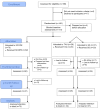Internet-Delivered Psychoeducation (SCOPE) for Transition-Aged Autistic Youth: Pragmatic Randomized Controlled Trial
- PMID: 39608000
- PMCID: PMC11638691
- DOI: 10.2196/49305
Internet-Delivered Psychoeducation (SCOPE) for Transition-Aged Autistic Youth: Pragmatic Randomized Controlled Trial
Erratum in
-
Correction: Internet-Delivered Psychoeducation (SCOPE) for Transition-Aged Autistic Youth: Pragmatic Randomized Controlled Trial.J Med Internet Res. 2025 Feb 10;27:e72209. doi: 10.2196/72209. J Med Internet Res. 2025. PMID: 39928925 Free PMC article.
Abstract
Background: Psychoeducation is a recommended first-line intervention for transition-aged autistic youth, but it has not been previously evaluated in an internet-delivered format. SCOPE (Spectrum Computerized Psychoeducation) is an 8-week individual, internet-delivered, therapist-supported psychoeducative intervention.
Objective: This study aimed to investigate the effectiveness of SCOPE through a 3-armed randomized controlled trial. The intervention aims to increase participants' understanding of autism and, in doing so, increase their quality of life (QoL).
Methods: SCOPE was codeveloped with clinicians and autistic young adults. It contains 8 autism-related modules, each with (1) text describing the module topic, (2) four video vignettes with recurring characters who describe their lives and perspectives on the module topic, (3) a list of neurotypical characteristics related to the module's topic, and (4) self-reflection using 3 or 4 questions about the module topic, answered by multiple-choice bullets and voluntary open-ended written comments. Participants were randomized (2:1:1) to SCOPE, an active control (web-based self-study), or treatment as usual (TAU). The primary outcome was participants' autism knowledge, assessed using the Autism Spectrum Disorder Quiz, and secondary outcomes included acceptance of diagnosis, QoL, and symptoms of mental health problems. All outcomes were assessed at the baseline, postintervention, and 3-month follow-up time points, using mixed-effects models to assess change in outcome measures across time points.
Results: Between 2014 and 2020, a total of 141 participants were randomized to 1 of the 3 treatment arms. The SCOPE participants had significantly greater autism knowledge gains at the posttreatment time point compared to TAU participants with a moderate effect size (d=0.47; P=.05); gains were maintained at the 3-month follow-up (d=0.46; P=.05). The self-study participants also had increased knowledge gains compared to TAU participants at the posttreatment time point with a moderate effect size (d=0.60; P=.03) but did not maintain these gains at the 3-month follow-up, and their autism knowledge scores returned to baseline (mean change score: -0.13, 95% CI -1.20 to 0.94; P=.81). In addition, SCOPE participants reported improved QoL at the postintervention (d=0.37, P=.02) and 3-month follow-up time points (d=0.60; P=.001), compared to the combined controls. The gained autism knowledge was not mirrored by changes in symptoms of anxiety or depression.
Conclusions: Effective internet-delivered interventions may facilitate first-line service access to individuals who are unable or unwilling to use traditional health care interventions or who live in geographically remote locations. Additionally, an intervention such as SCOPE could impart and sustain the knowledge gained through psychoeducation in transition-aged autistic youth. For future research, qualitative studies could further our understanding of the lived experiences of intervention participation and outcomes after internet-delivered psychoeducation.
Trial registration: ClinicalTrials.gov NCT03665363; https://clinicaltrials.gov/study/NCT03665363.
Keywords: ASD; RCT; autism; autism spectrum disorder; autistic; codeveloped; digital communication; internet based; intervention; life satisfaction; patient education; psychoeducation; randomized; randomized controlled trial; young adult.
©Anna Backman, Lise Roll-Pettersson, Are Mellblom, Elisabet Norman-Claesson, Emma Sundqvist, Eric Zander, Sarah Vigerland, Tatja Hirvikoski. Originally published in the Journal of Medical Internet Research (https://www.jmir.org), 28.11.2024.
Conflict of interest statement
Conflicts of Interest: AB, SV, AM, ENC, ES, and TH are employed by Region Stockholm. AB receives royalties from the publisher Natur och Kultur for a popular science book unrelated to this study. TH receives royalties from Hogrefe for treatment manuals unrelated to this study. EZ receives royalties from the Hogrefe Publishing Group for the Swedish version of the Social Responsiveness Scale, Second Edition (SRS-2). LRP discloses no conflicts of interest related to this study.
Figures


References
-
- Thompson C, Bölte S, Falkmer T, Girdler S. To be understood: transitioning to adult life for people with autism spectrum disorder. PLoS One. 2018;13(3):e0194758. doi: 10.1371/journal.pone.0194758. https://dx.plos.org/10.1371/journal.pone.0194758 PONE-D-16-45680 - DOI - DOI - PMC - PubMed
-
- Howlin P. Adults with autism: changes in understanding since DSM-111. J Autism Dev Disord. 2021;51(12):4291–4308. doi: 10.1007/s10803-020-04847-z. https://europepmc.org/abstract/MED/33474661 10.1007/s10803-020-04847-z - DOI - PMC - PubMed
-
- Taylor JL, Henninger NA. Frequency and correlates of service access among youth with autism transitioning to adulthood. J Autism Dev Disord. 2015;45(1):179–191. doi: 10.1007/s10803-014-2203-x. https://europepmc.org/abstract/MED/25081594 - DOI - PMC - PubMed
Publication types
MeSH terms
Associated data
LinkOut - more resources
Full Text Sources
Medical

